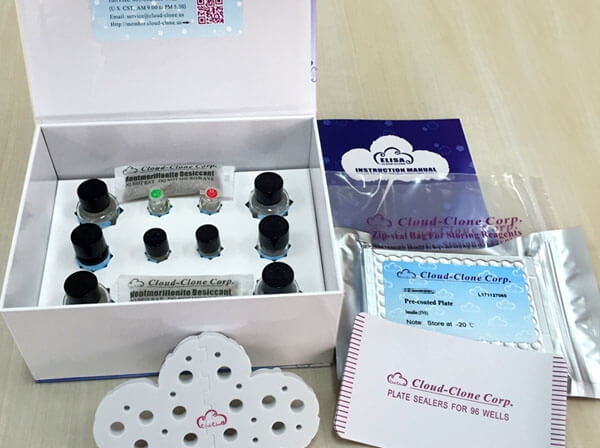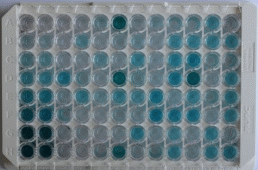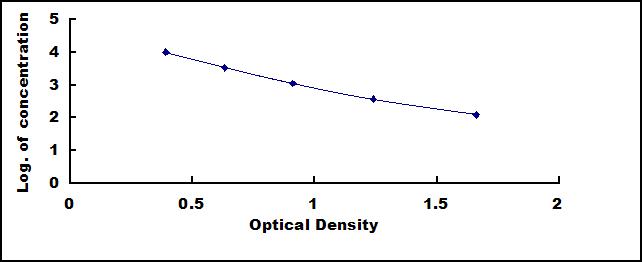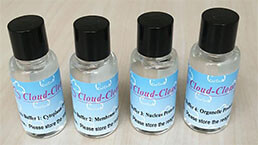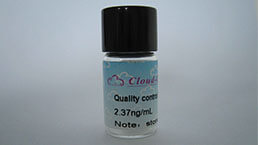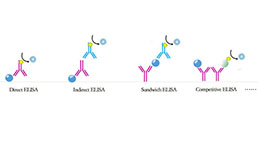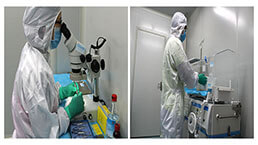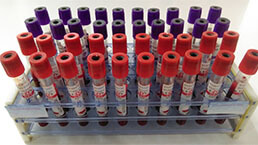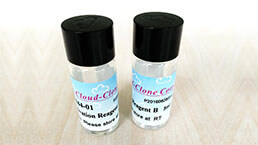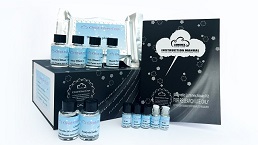ELISA Kit for Cathelicidin Antimicrobial Peptide (CAMP) 

CAP18; FALL39; HSD26; LL37; 18 kDa Cationic Antimicrobial Protein; Antibacterial protein FALL-39; FALL-39 peptide antibiotic
- UOM
- FOB US$ 476.00 US$ 680.00 US$ 3,060.00 US$ 5,780.00 US$ 47,600.00
- Quantity
Overview
Properties
- Product No.CEC419Hu
- Organism SpeciesHomo sapiens (Human) Same name, Different species.
- ApplicationsEnzyme-linked immunosorbent assay for Antigen Detection.
Research use only - DownloadInstruction Manual
- CategoryInfection immunity
Sign into your account
Share a new citation as an author
Upload your experimental result
Review

Contact us
Please fill in the blank.
Recovery
Matrices listed below were spiked with certain level of recombinant Cathelicidin Antimicrobial Peptide (CAMP) and the recovery rates were calculated by comparing the measured value to the expected amount of Cathelicidin Antimicrobial Peptide (CAMP) in samples.
| Matrix | Recovery range (%) | Average(%) |
| serum(n=5) | 90-97 | 93 |
| EDTA plasma(n=5) | 92-105 | 96 |
| heparin plasma(n=5) | 91-101 | 97 |
Precision
Intra-assay Precision (Precision within an assay): 3 samples with low, middle and high level Cathelicidin Antimicrobial Peptide (CAMP) were tested 20 times on one plate, respectively.
Inter-assay Precision (Precision between assays): 3 samples with low, middle and high level Cathelicidin Antimicrobial Peptide (CAMP) were tested on 3 different plates, 8 replicates in each plate.
CV(%) = SD/meanX100
Intra-Assay: CV<10%
Inter-Assay: CV<12%
Linearity
The linearity of the kit was assayed by testing samples spiked with appropriate concentration of Cathelicidin Antimicrobial Peptide (CAMP) and their serial dilutions. The results were demonstrated by the percentage of calculated concentration to the expected.
| Sample | 1:2 | 1:4 | 1:8 | 1:16 |
| serum(n=5) | 92-103% | 80-91% | 97-104% | 90-99% |
| EDTA plasma(n=5) | 78-94% | 78-98% | 82-102% | 84-102% |
| heparin plasma(n=5) | 78-101% | 80-90% | 79-89% | 83-97% |
Stability
The stability of kit is determined by the loss rate of activity. The loss rate of this kit is less than 5% within the expiration date under appropriate storage condition.
To minimize extra influence on the performance, operation procedures and lab conditions, especially room temperature, air humidity, incubator temperature should be strictly controlled. It is also strongly suggested that the whole assay is performed by the same operator from the beginning to the end.
Reagents and materials provided
| Reagents | Quantity | Reagents | Quantity |
| Pre-coated, ready to use 96-well strip plate | 1 | Plate sealer for 96 wells | 4 |
| Standard | 2 | Standard Diluent | 1×20mL |
| Detection Reagent A | 1×120µL | Assay Diluent A | 1×12mL |
| Detection Reagent B | 1×120µL | Assay Diluent B | 1×12mL |
| TMB Substrate | 1×9mL | Stop Solution | 1×6mL |
| Wash Buffer (30 × concentrate) | 1×20mL | Instruction manual | 1 |
Assay procedure summary
1. Prepare all reagents, samples and standards;
2. Add 50µL standard or sample to each well.
And then add 50µL prepared Detection Reagent A immediately.
Shake and mix. Incubate 1 hour at 37°C;
3. Aspirate and wash 3 times;
4. Add 100µL prepared Detection Reagent B. Incubate 30 minutes at 37°C;
5. Aspirate and wash 5 times;
6. Add 90µL Substrate Solution. Incubate 10-20 minutes at 37°C;
7. Add 50µL Stop Solution. Read at 450 nm immediately.

Test principle
This assay employs the competitive inhibition enzyme immunoassay technique. A monoclonal antibody specific to Cathelicidin Antimicrobial Peptide (CAMP) has been pre-coated onto a microplate. A competitive inhibition reaction is launched between biotin labeled Cathelicidin Antimicrobial Peptide (CAMP) and unlabeled Cathelicidin Antimicrobial Peptide (CAMP) (Standards or samples) with the pre-coated antibody specific to Cathelicidin Antimicrobial Peptide (CAMP). After incubation the unbound conjugate is washed off. Next, avidin conjugated to Horseradish Peroxidase (HRP) is added to each microplate well and incubated. The amount of bound HRP conjugate is reverse proportional to the concentration of Cathelicidin Antimicrobial Peptide (CAMP) in the sample. After addition of the substrate solution, the intensity of color developed is reverse proportional to the concentration of Cathelicidin Antimicrobial Peptide (CAMP) in the sample.
Giveaways
Increment services
Citations
- The Assessment of Vitamin D, Antimicrobial Peptides and Procalcitonin in BronchiectasisWaikato:Source
- Host immune response to tuberculous meningitisPubmed:25301213
- On birth single dose live attenuated OPV and BCG vaccination induces gut cathelicidin LL37 responses at 6 week of age: A natural experimentPubmed:25444792
- Modulating the Internalization of Bacille Calmette-Guérin by Cathelicidin in Bladder Cancer Cells Pubmed:25681250
- Modulating the Internalization of Bacille Calmette-Guérin by Cathelicidin in Bladder Cancer CellsPubMed: 25681250
- Cathelicidin as a link between sarcoidosis and tuberculosisPubMed: 26422567
- The association of vitamin D, cathelicidin, and vitamin D binding protein with acute asthma attacks in childrenPubMed: 26108071
- Swiftly Decreasing Cerebrospinal Fluid Cathelicidin Concentration Predicts Improved Outcome in Childhood Bacterial Meningitis.Pubmed:27008883
- Light-emitting diodes downregulate cathelicidin, kallikrein and toll-like receptor 2 expressions in keratinocytes and rosacea-like mouse skin.pubmed:27315464
- Reduced Expression of the Extracellular Calcium-Sensing Receptor (CaSR) Is Associated withActivation of the Renin-Angiotensin System (RAS) to Promote Vascular Remodeling in the Pathogenesis of Essential Hypertension.pubmed:27391973
- Ginsenoside Rg5 Inhibits Succinate-Associated Lipolysis in Adipose Tissue and Prevents Muscle Insulin Resistance.pubmed:28261091
- The relation of innate and adaptive immunity with viral-induced acute asthma attacks: Focusing on IP-10 and cathelicidinpubmed:27955890
- Effects of cold exposure on the bone marrow adipose tissueDOI: 10.3969/j.issn.1674-2591.2017.05.008
- Measurements of AMPs in stratum corneum of atopic dermatitis and healthy skin–tape stripping techniquePubmed:29374283
- Antimalarial activity of vitamin D3 (VD3) does not result from VD3-induced antimicrobial agents including nitric oxide or cathelicidinPubmed: 30904694
- Myeloid cell-derived LL-37 promotes lung cancer growth by activating Wnt/β-catenin signalingPubmed: 31149039
- Short-Term versus Long-Term Culture of A549 Cells for Evaluating the Effects of Lipopolysaccharide on Oxidative Stress, Surfactant Proteins and Cathelicidin LL-37Pubmed: 32050475
- Hypovitaminosis D and reduced cathelicidin are strongly correlated during the multidrug therapy against leprosyPubmed: 32645421
- Effect of Lonicerae japonicae Flos Carbonisata-Derived Carbon Dots on Rat Models of Fever and Hypothermia Induced by LipopolysaccharidePubmed: 32606669
- Relações causais entre a expressão dos genes do receptor de Vitamina D e do Peptídeo Antimicrobiano Catelicidina sobre marcadores sorológicos de pessoas com …
- Beneficial impact of cathelicidin on hypersensitivity pneumonitis treatment¡ªIn vivo studies33999928
- Analysis of the level of non-specific and specific immunity parameters in saliva of children with osteogenesis imperfecta and study of relationships between?¡
- Type I interferons link skin-associated dysbiotic commensal bacteria to pathogenic inflammation and angiogenesis in rosacea
- Compartmentalized Innate Immune Response of Human Fetal Membranes against Escherichia coli Choriodecidual InfectionPubmed:35328414
- LL-37 transports immunoreactive cGAMP to activate STING signaling and enhance interferon-mediated host antiviral immunityPubmed:35649354




